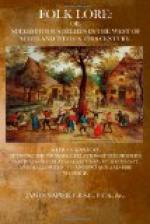This style of antidote against the influence of an evil eye was common in England within the century, as the following, which is also taken from a letter which appeared in the same journal, seems to show:—“Drawing blood from above the mouth of the person suspected is the favourite antidote in the neighbourhood of Burnley; and in the district of Craven, a few miles within the borders of Yorkshire, a person who was ill-disposed towards his neighbours is believed to have slain a pear-tree which grew opposite his house by directing towards it ‘the first morning glances’ of his evil eye. Spitting three times in the person’s face; turning a live coal on the fire; and exclaiming, ’The Lord be with us,’ are other means of averting its influence.”
We must not, however, pursue this digression further, but return to our proper subject. It was not necessary that the person possessed of the evil eye, and desirous of inflicting evil upon a child, should see the child. All that was necessary was that the person with the evil eye should get possession of something which had belonged to the child, such as a fragment of clothing, a toy, hair, or nail parings. I may note here that it was not considered lucky to pare the nails of a child under one year old, and when the operation was performed the mother was careful to collect every scrap of the cutting, and burn them. It was considered a great offence for any person, other than the mother or near relation, in whom every confidence could be placed, to cut a baby’s nails; if some forward officious person should do this, and baby afterwards be taken ill, this would give rise to grave suspicions of evil influence being at work. The same remarks apply to the cutting of a baby’s hair. I have seen the door locked during hair-cutting, and the floor swept afterwards, and the sweepings burned, lest perchance any hairs might remain, and be picked up by an enemy. Dr. Livingstone, in his book on the Zambesi, mentions the existence of a similar practice among some African tribes. “They carefully collect and afterwards burn or bury the hair, lest any of it fall into the hands of a witch.” Mr. Munter mentions that the same practice is common amongst the Patagonians, and the practice extends to adults. He says that after bathing, which they do every morning, “the men’s hair is dressed by their wives, daughters, or sweethearts, who take the greatest care to burn the hairs that may be brushed out, as they fully believe that spells may be wrought by evil-intentioned persons who can obtain a piece of their hair. From the same idea, after cutting their nails the parings are carefully committed to the flames.”




